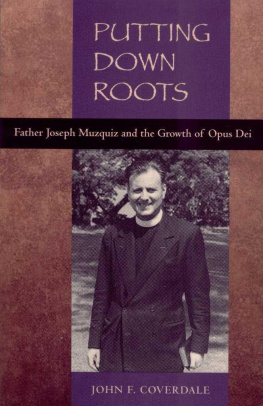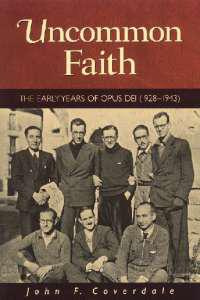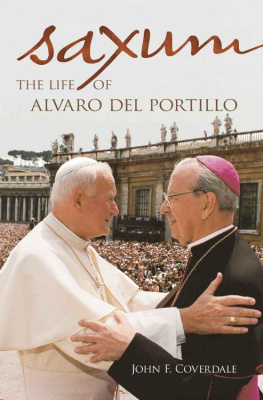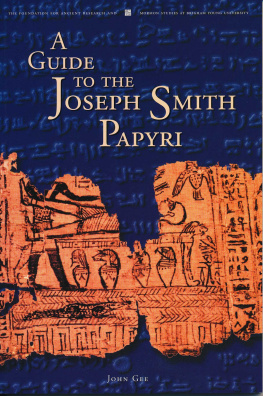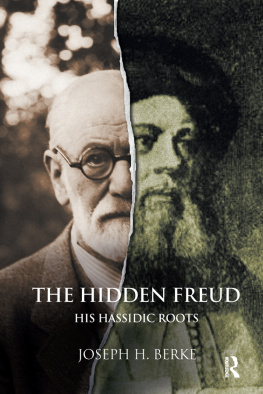John F. Coverdale - Putting Down Roots: Fr. Joseph Muzquiz and the Growth of Opus Dei
Here you can read online John F. Coverdale - Putting Down Roots: Fr. Joseph Muzquiz and the Growth of Opus Dei full text of the book (entire story) in english for free. Download pdf and epub, get meaning, cover and reviews about this ebook. year: 2017, publisher: Scepter Publishers, genre: Detective and thriller. Description of the work, (preface) as well as reviews are available. Best literature library LitArk.com created for fans of good reading and offers a wide selection of genres:
Romance novel
Science fiction
Adventure
Detective
Science
History
Home and family
Prose
Art
Politics
Computer
Non-fiction
Religion
Business
Children
Humor
Choose a favorite category and find really read worthwhile books. Enjoy immersion in the world of imagination, feel the emotions of the characters or learn something new for yourself, make an fascinating discovery.
- Book:Putting Down Roots: Fr. Joseph Muzquiz and the Growth of Opus Dei
- Author:
- Publisher:Scepter Publishers
- Genre:
- Year:2017
- Rating:4 / 5
- Favourites:Add to favourites
- Your mark:
- 80
- 1
- 2
- 3
- 4
- 5
Putting Down Roots: Fr. Joseph Muzquiz and the Growth of Opus Dei: summary, description and annotation
We offer to read an annotation, description, summary or preface (depends on what the author of the book "Putting Down Roots: Fr. Joseph Muzquiz and the Growth of Opus Dei" wrote himself). If you haven't found the necessary information about the book — write in the comments, we will try to find it.
Putting Down Roots: Fr. Joseph Muzquiz and the Growth of Opus Dei — read online for free the complete book (whole text) full work
Below is the text of the book, divided by pages. System saving the place of the last page read, allows you to conveniently read the book "Putting Down Roots: Fr. Joseph Muzquiz and the Growth of Opus Dei" online for free, without having to search again every time where you left off. Put a bookmark, and you can go to the page where you finished reading at any time.
Font size:
Interval:
Bookmark:
PUTTING DOWN ROOTS
FATHER JOSEPH MUZQUIZ and the GROWTH OF OPUS DEI
1912-1983
John F. Coverdale
Copyright 2009, John F. Coverdale
The total or partial reproduction of this book is not permitted, nor its in-formatic treatment, or the transmission of any form or by any means, either electronic, mechanic, photocopy or other methods, without the prior written permission of the owners of the copyright.
Copyright 2009, Scepter Publishers, Inc. P.O. Box 211, New York, N.Y. 10018 www. scepterpublishers. org
Printed in the United States of America
ISBN-13: 978-1-59417-081-2
Library of Congress Cataloging-in-Publication Data Coverdale, John F., 1940-
Putting down roots : Father Joseph Muzquiz and the growth of Opus Dei,
1912-1983 / John F. Coverdale. p. cm.
ISBN 978-1-59417-081-2 (alk. paper)
1. Opus Dei (Society)-History-20th century. 2. Opus Dei (Society)-United States-History-20th century. 3. Muzquiz, Joseph, 1912-1983. I. Title.
BX819.3.068C675 2009
267'.182092-dc22
[B]
2009035361
CONTENTS
)
)
)
)
)
NOTE TO THE READER ON SOURCES
This brief biography rests primarily on two groups of sources: 1) Father Muzquiz's papers including his correspondence with St. Josemara Escriv and 2) the written recollections of many people who knew him. I have quoted frequently from both because the actual words of Father Muzquiz and of the people who knew him are richer and more informative than a paraphrase.
When a quotation is from Father Muzquiz, that will be obvious from the text. I considered using footnotes to give the names of the persons whose recollections I quote. On further reflection I realized that since readers would not recognize the names, footnotes would only encumber the text without providing useful information. I decided, therefore, to omit them.
If a reader is interested in the source of a particular statement, inquiries can be directed to coverdale.john@gmail.com.
INTRODUCTION
Late in the afternoon of February 17, 1949, Father Jose Luis Muzquiz,[1] a thirty-six-year-old Spanish priest, arrived in New York aboard a TWA Super Constellation. He was accompanied by Sal Ferigle,[2] a physics graduate student. Neither of them spoke much English, and between the two of them they had only a few dollars to their name. They had come to begin the apostolic activities of Opus Dei in the United States. Today Opus Dei is a well-known personal prelature of the Catholic Church whose founder, St. Josemara Escriv, was canonized by Pope John Paul II, but in 1949 only a handful of Americans had ever heard of it.
Thirty-four years later, on Sunday June 5, 1983, only a few weeks before his sudden death, Muzquiz joined a thousand American members and friends of the Workas Opus Dei is popularly calledin an auditorium at Hunter College in New York for an informal meeting with the Prelate of Opus Dei, Mon-signor Alvaro Del Portillo. As he hugged Muzquiz, Del Portillo commented, 'You have to thank God and feel great joy seeing that the Work has put down deep roots in the United States."
Today, many people throughout the United States and in other countries pray to Father Joseph, as he was called in this country, and pray that one day the Church will declare him a saint. Readers of this book will learn why.
PART I
SPAIN
1912-1949
YOUTH AND FIRST CONTACTS WITH OPUS DEI
JOSE LUIS MUZQUIZ WAS BORN ON OCTOBER 14, 1912, in the city of Badajoz in the southwestern corner of Spain, close to the Spanish-Portuguese border. He was the first child of the former Maria de Miguel, the twenty-three-year-old daughter of a prominent Badajoz physician and landowner, and Miguel Muzquiz, a thirty-year-old career army officer. Miguel Muzquiz's father, an engineer, had emigrated to Cuba with his family after he lost his possessions as a result of a civil war in Spain. He had died in Cuba when Miguel was thirteen. His widow had returned to Spain with her six children. Miguel would have liked to become a professor, but decided to attend the military academy instead so as to help the family economically. He met and married Maria while stationed in Badajoz.
The Muzquizs, an affectionate couple who got along well together, were unusually independent by the standards of the time. During the first part of the family's summer vacations, Miguel, who had become a baseball fan during his youth in Cuba, would travel alone to attend the Spanish baseball championships before joining the rest of the family in Badajoz. Maria for her part went to the movies unaccompanied by Miguel, although it was unusual for married Spanish women to attend movies without their husbands. Both attended Mass and received communion daily, but normally they went to church separately.
While Jose Luis was still an infant, his father obtained an appointment as professor of languages at the military academy and the family moved to Toledo, fifty miles southeast of Madrid. There Muzquiz began his education in the public school. Although he was first in his class, his father felt he didn't study enough.
The Muzquizs spent their summer vacations in Maria's family home near Badajoz where Jose Luis played cops and robbers with his cousins and enjoyed life in the countryside. His letters to his father display a normal boy's interest in farm animals and in automobiles, which were still fairly rare in Spain. When he was fourteen, his father resigned his commission in the army and moved the family to Madrid where he took a position as a teacher in a Jesuit high school. That same year Jose Luis' only sister, Sagrario, was born. Although he was an affectionate older brother and looked out for his sister, because of their age difference they were, in her words, "more like two only children than like brother and sister."
Muzquiz studied science in the high school where his father taught and earned top grades in all subjects. He joined the school's religious association, and headed a group of students who taught catechism to younger students in one of the poorer neighborhoods of Madrid. One of his classmates recalls him as "one of the tallest students in the class, friendly, unusually mature, self-controlled, and pious."
After graduating from high school in 1928, Muzquiz decided to study civil engineering, a subject taught only in Madrid's Special School of Engineering of Highways, Canals, and Ports, one of the most prestigious university-level institutions in Spain and one of the most selective. Students had to pass a rigorous entrance exam in mathematics and other subjects at a level well beyond what was taught in high school. It was common to spend three, four, or even five years in private academies preparing for the exam. After only two years, Muzquiz won admission to the school in a year in which more than nine hundred applicants vied for thirty places. He was one of only two students in his year to be admitted less than three years after graduating from high school.
On the basis of his scores on the entrance exam, Muzquiz entered the engineering school as the second-ranked student. He told his father that he had no intention of trying to displace the first-ranked student, who was a good friend. He studied every day but not very long, often while walking around the house humming to himself and eating a late afternoon snack that left the house full of crumbs. He did not cram for exams and at times went to a party on the night before an exam. To earn spending money, he tutored students in mathematics. Occasionally he played practical jokes on his fellow students. After a field trip to Soria, for example, he sent a classmate a bogus letter supposedly from a young woman they had met during the trip.
A tall, handsome, athletic student with excellent professional and financial prospects and a pleasant character, Muzquiz enjoyed an active social life and had lots of friends among girls his age, but no serious girl friend. He belonged to a tennis club, where he often played with his cousins. On Sundays he liked to ski with several friends in the mountains near Madrid, often returning late. He spent the summers of 1932 and 1933 in England learning English.
Next pageFont size:
Interval:
Bookmark:
Similar books «Putting Down Roots: Fr. Joseph Muzquiz and the Growth of Opus Dei»
Look at similar books to Putting Down Roots: Fr. Joseph Muzquiz and the Growth of Opus Dei. We have selected literature similar in name and meaning in the hope of providing readers with more options to find new, interesting, not yet read works.
Discussion, reviews of the book Putting Down Roots: Fr. Joseph Muzquiz and the Growth of Opus Dei and just readers' own opinions. Leave your comments, write what you think about the work, its meaning or the main characters. Specify what exactly you liked and what you didn't like, and why you think so.

